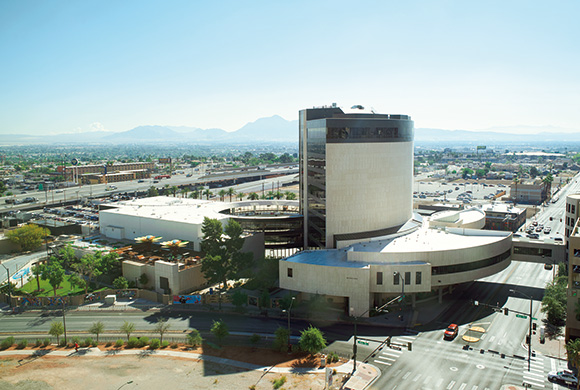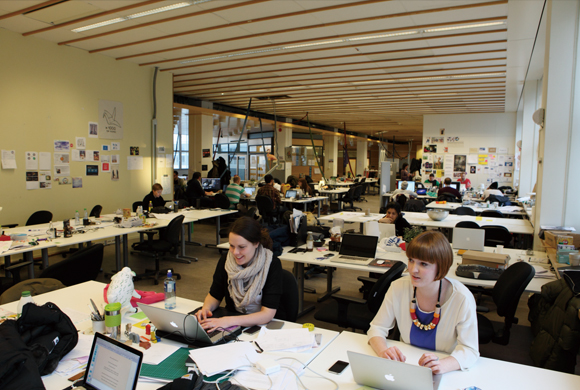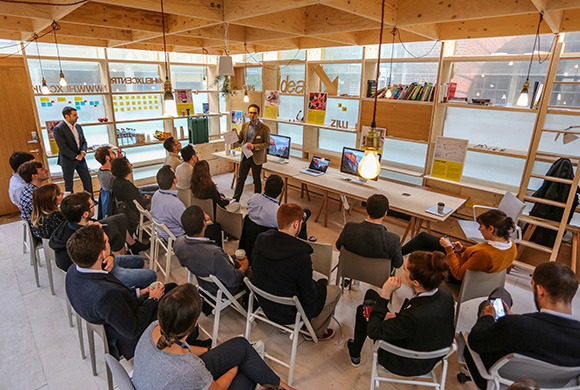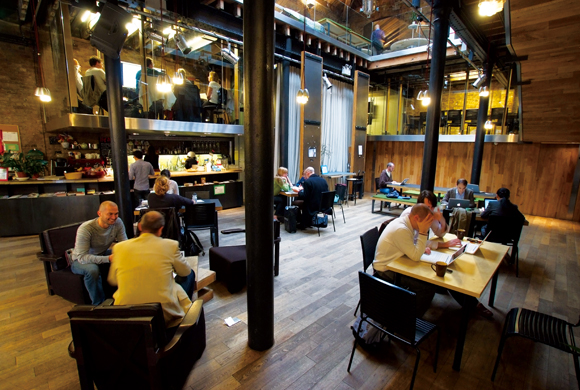Workplace
Jul. 6, 2015
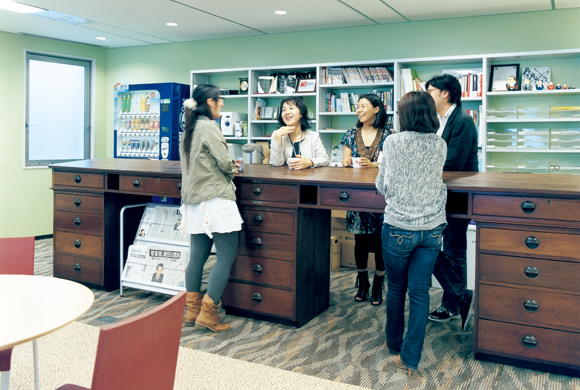
A Lounge for Good Relations with Customers
Involving employees in the space-creation process
[Lifenet Insurance Company] Tokyo, Japan
The name “Samarkand” was decided by the employees. “One day, I got an email from someone about getting submissions for a name for the new multi-purpose space,” Mr. Deguchi says. “I also put in my idea, which unfortunately was turned down.” The concept that was decided was that this is a place that will be a crossroads for people from all over the world.
“At first, we talked about how there wasn’t enough meeting space, and that expansion was needed,” says Kenji Tsutsumi, Manager of the General Affairs Office. “The designer drew up about 20 different layouts for us, but none quite fit. The final idea actually came when we visited another company. We just needed to create the space in a way that would fit our way of doing business.”
Within this undivided space are many different items, but still with a general sense of unity. “It didn’t cost that much, because the furniture is all old,” Mr. Tsutsumi says. “Even so, we still selected them for a sense of harmony.” Stepping into Samarkand brings an unusual sense of coziness. It’s not just the smart values shown, but everything is in a good balance.
“Right alongside people eating lunch or holding team meetings are meetings with partner companies or study group meetings,” Mr. Tsutsumi says. “That doesn’t mean that they are all a hindrance, but that this is a place that motivates people.”

The Fureai Fair space is normally an area for breaks, but can also be used for seminars, study group sessions and other events.

The counter in the Samarkand room. It originally was a reception counter in a foreign-based bank. It was being discarded as the bank pulled out of Japan, so Lifenet put it back to its original use.

Beyond the glass is the systems department office. The glass and mirrored surfaces of the walls give a bright feeling.
Lifenet is fundamentally a company where juniors dominate seniors, Mr. Deguchi says. “It’s really hard to remember when you’re 63 years old,” he says of his first attempts at Twitter and Facebook, “but employees in their 20s admonished me, ‘This is for our customers,’ so I started using them.” Now he happily sends out tweets while doing things like riding the train.
The only person in the company with a private office is Mr. Deguchi, “When I’m not around, employees use it as a meeting room,” he says.
“Recently when I came back from lunch, the door was locked and there was a note saying, ‘I need the room for about 10 more minutes, so go play a little longer!’ Employees just see it as one more meeting room, and don’t think that I use it very often.”
Once, one of the young employees said, “The call center’s operating hours from 9 to 6 is not really reflecting customer needs. Customers who work can’t use the phone during those hours. It should be open 24 hours a day.” “People today are working in three shifts,” Mr. Deguchi says, “so not everyone has Saturday and Sunday off. So we extended the hours to 10 pm.” This was a first for the industry in Japan, and resulted from a bold suggestion by a young employee.
“Another infrastructure for discussion is the in-house SNS,” Mr. Tsutsumi says. “Like Twitter, employee comments are arranged along a timeline. Someone posts, then someone else adds to the list. Even employees who aren’t taking part can join in, too.” Lifenet Insurance is putting special effort into the use of the Internet for information sharing. “Since the company gave approval a year ago, nearly all employees have their own blogs,” says Yohei Matsuoka of the Marketing Department. “This isn’t just for top management, but we feel it is important that every employee creates and posts their own contents.”
The company does have internal guidelines on social media. “It’s OK for individuals to do these postings, and, rather than stop people because they’re doing a bad job, we think it’s worse if people don’t post because they’re scared of the process,” Mr. Matsuoka says.
WORKSIGHT 01(2011.10)

In 2011, the number of policies taken out with Lifenet reached 80,000. In a ranking in Weekly Diamond magazine, the company’s product was ranked number one.

Study groups and seminars are developed by the employees themselves. There are also many successful extracurricular activities to ensure “the fun of work.” Futsal, swimming, a curry-cooking club and even a yoga class held in Samarkand are available.

Held once every three months, policy holders visit Lifenet for the Fureai Fair. The company explains its results, outlines future business plans, and gives customers a chance to express themselves.

Haruaki Deguchi
Formerly in Corporate Planning, and Manager of International Business at Nippon Life Insurance, before founding Lifenet in 2006. Well known as an opinion leader in the life insurance industry.

Yohei Matsuoka
Marketing Department Manager. He previously worked in a foreign-based strategic consulting firm. Both have been with Lifenet since its startup days.

Kenji Tsutsumi
Manager of General Affairs. He worked for another insurance company in corporate sales and other areas.






